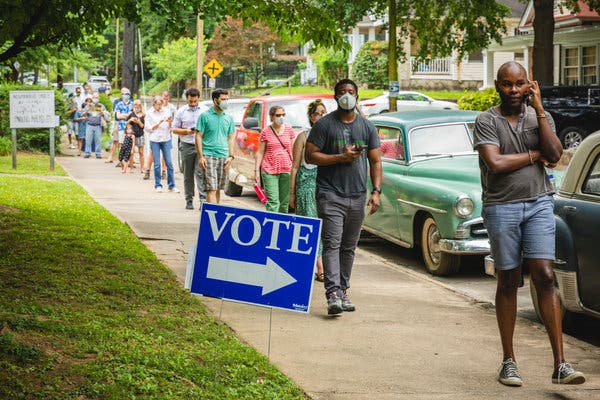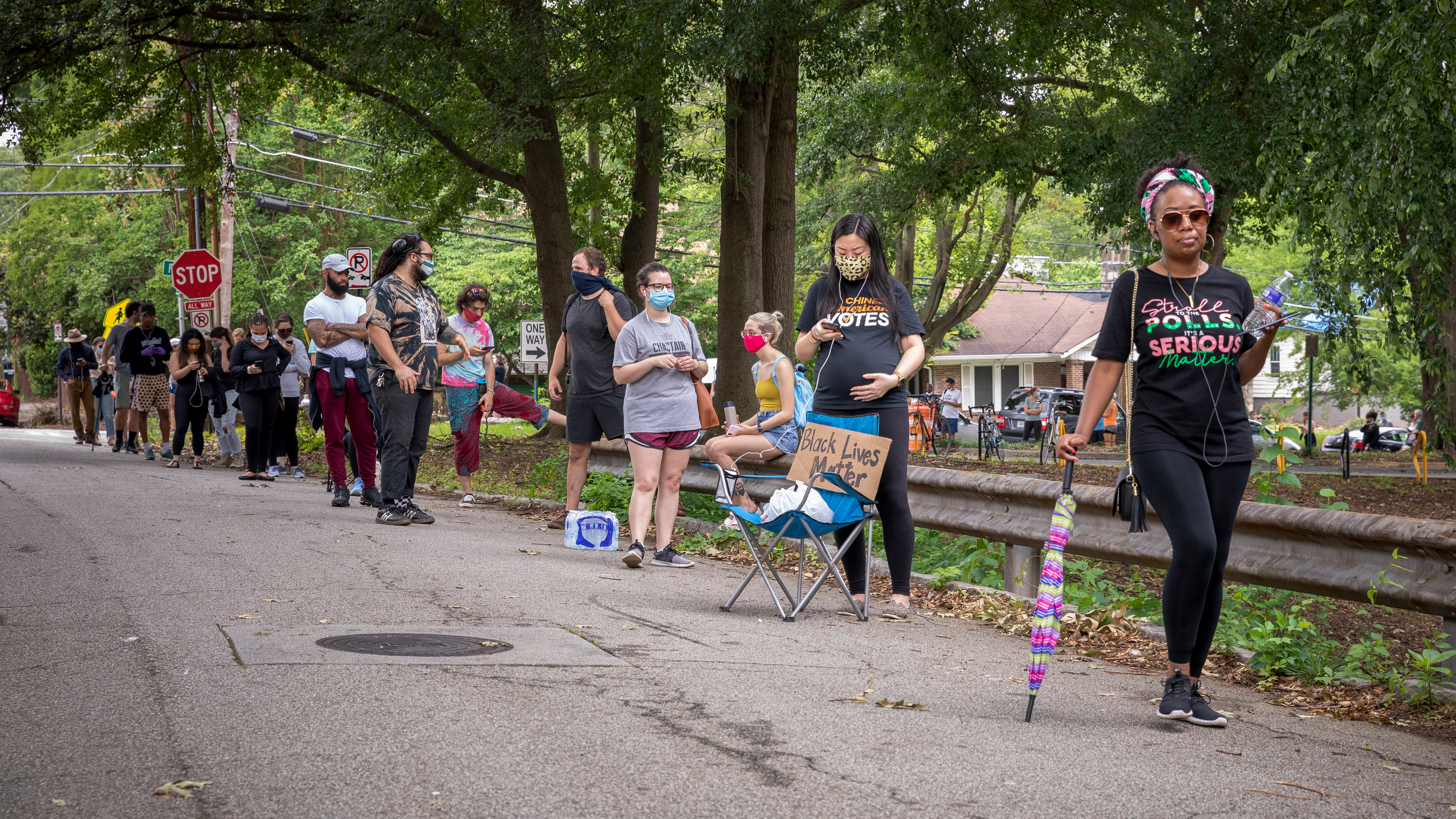Advertisement
A day after the state’s elections descended into confusion, Mr. Ossoff, a 33-year-old Democrat, emerged as the party’s challenger to the Republican incumbent, Senator David Perdue.

ATLANTA — Jon Ossoff, the 33-year-old Georgia Democrat who earned national attention in 2017 with a spirited but unsuccessful congressional race in the Atlanta suburbs, won his party’s nomination in a race for a Senate seat on Wednesday, a day after the state’s elections descended into chaos.
Mr. Ossoff will now face off against Senator David Perdue, an incumbent Republican and ally of President Trump’s. The general election in November, one of two Senate races in the state that are expected to be competitive and could help tip the balance of power in Congress, will almost certainly be viewed as a referendum on Trumpism. Mr. Perdue, a business executive who is seeking a second term, has highlighted his close relationship with the president, arguing that it has helped Georgia’s business climate.
With 97 percent of precincts reporting on Wednesday evening, Mr. Ossoff had 50.5 percent of the vote, just over the 50 percent threshold to avoid a runoff election against Teresa Tomlinson, a former mayor of Columbus, Ga., who trailed far behind with 15 percent.
Mr. Ossoff’s run three years ago in a special election in Georgia’s Sixth District, a longtime Republican redoubt, was fueled by hostility toward Mr. Trump, particularly among educated suburban women. But Mr. Ossoff also benefited from anti-Trump sentiment beyond the district, attracting significant funding from beyond Georgia and shattering congressional fund-raising records.
In his previous race, Mr. Ossoff positioned himself as a practical-minded moderate. His TV ads in recent weeks have focused on his vow to improve the health care system and his endorsement from Representative John Lewis of Georgia, the Democrat and storied civil rights leader.
The crowded Democratic field included Ms. Tomlinson; Sarah Riggs Amico, a former candidate for lieutenant governor; and four others.

The state’s elections Tuesday were a chaotic affair, with a new state-mandated voting system plagued by serious problems. Many computerized voting machines malfunctioned early in the morning, and poll workers struggled to get them back online, resulting in hourslong waits at polling places, particularly in the heavily populated precincts in and around Atlanta.
The glitchy system reignited long-simmering concerns among Democrats that the Republican Party is intent on making voting as difficult as possible for some Georgians, particularly black voters. Gov. Brian Kemp, a former secretary of state, and the current holder of that office, Brad Raffensperger, both Republicans, supported the adoption of the new voting system, despite warnings from elections experts that it was being instituted too hastily and without due consideration to potential hacking.
Stacey Abrams, the Democrats’ 2018 nominee in the governor’s race, has accused Mr. Kemp of creating numerous impediments to voters of color, and argued long after that election that she actually won. On Tuesday, Ms. Abrams, who is African-American, called the problems at the polls “a disaster that was preventable.”

Since 2018, Democrats have hoped that Georgia might become a true swing state in the 2020 elections as frustration mounts over Mr. Trump’s first-term performance.
Though Mr. Ossoff lost the 2017 special election to Karen Handel, a Republican, Ms. Handel then lost the next year to Lucy McBath, a Democrat. Ms. Handel won Tuesday’s G.O.P. primary for the same seat, defeating four opponents in a district that was represented by Newt Gingrich for 20 years.
In Georgia’s Seventh District, which was once reliably Republican territory but includes an increasingly diverse section of metro Atlanta, there were contested primaries on both sides for the seat held by Representative Rob Woodall, a Republican who is not running for re-election.
Mr. Woodall won by fewer than 500 votes in 2018, and his opponent in that race, Carolyn Bourdeaux, was again seeking the Democratic nomination. She fell just short of the 50 percent threshold and will enter a runoff against Brenda Lopez Romero, a state assemblywoman. Another Democrat in the race, Nabilah Islam, was endorsed by Representative Alexandria Ocasio-Cortez of New York but finished in third place.
In South Carolina, Nancy Mace, the first woman to graduate from the Citadel, won the Republican congressional primary in the First District and will now face Representative Joe Cunningham, who flipped the Charleston-based seat in 2018 in a long-shot Democratic victory. Ms. Mace finished far ahead of her top Republican opponent, Kathy Landing, who had been endorsed by the conservative insurgents in the House Freedom Caucus.
West Virginia voters choosing a governor had competitive primaries in both parties. Gov. Jim Justice, a Republican who was elected in 2016 as a Democrat and switched parties at the behest of President Trump, handily beat back a primary challenge from Woody Thrasher, a former member of his cabinet.
Mr. Justice, the state’s richest man and the owner of the Greenbrier Resort, has faced calls to resign from fellow Republicans, federal investigations and lawsuits against his companies.
He will face Ben Salango, a county commissioner from Charleston, who was the establishment favorite endorsed by the state’s major labor unions and Senator Joe Manchin III.
Mr. Salango defeated Stephen Smith, a nonprofit director, who ran as a progressive in the mold of Senator Bernie Sanders; Ron Stollings, a conservative Democrat who serves in the State Senate; and two other candidates.
West Virginia voters skew conservative and the state has not backed a Democrat for president since 1996, which was also the last time the state elected a Republican governor, Cecil H. Underwood.
In Nevada, Republicans were choosing challengers to Representative Susie Lee in the Third District, which Mr. Trump won by one percentage point in 2016, and Representative Steven Horsford in the Fourth District, which Hillary Clinton won by four points. Mr. Horsford was first elected in 2012, then lost re-election in 2014 before reclaiming the seat in 2018. Both could be competitive swing districts in the fall, though the Democratic incumbents start with significant advantages.
Voting was supposed to take place almost entirely by mail, but there were reports of long lines at some polling places. Many votes were left to be counted by Wednesday morning.
“As predicted, despite the secretary of state moving Nevada’s primary to an all-mail election, many Nevada voters still participated in person,” William McCurdy II, the chairman of the Nevada Democratic Party, said in a statement. “It is imperative the state offer an adequate amount of hygienic, well-organized polling locations and we will continue fighting for these improvements to prevent a repeat in November.”
Richard Fausset reported from Atlanta, and Reid J. Epstein from Washington.


